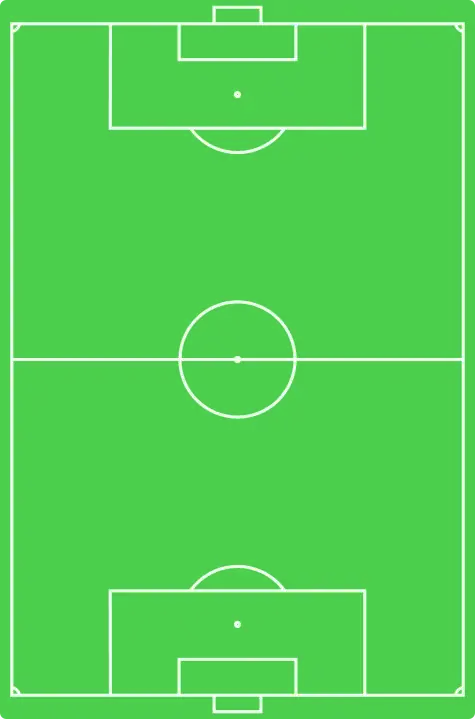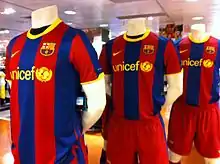FC Barcelona
Futbol Club Barcelona (Catalan pronunciation: [fubˈbɔl ˈklub bəɾsəˈlonə] (![]() listen)), commonly referred to as Barcelona and colloquially known as Barça ([ˈbaɾsə]), is a Spanish professional football club based in Barcelona, that competes in La Liga, the top flight of Spanish football.
listen)), commonly referred to as Barcelona and colloquially known as Barça ([ˈbaɾsə]), is a Spanish professional football club based in Barcelona, that competes in La Liga, the top flight of Spanish football.
.svg.png.webp) | ||||
| Full name | Futbol Club Barcelona | |||
|---|---|---|---|---|
| Nickname(s) | Barça or Blaugrana (team) Culés or Barcelonistas (supporters) Blaugranes or Azulgranas (supporters) | |||
| Short name | FCB | |||
| Founded | 29 November 1899 as Foot-Ball Club Barcelona | |||
| Ground | Camp Nou | |||
| Capacity | 99,354[1] | |||
| President | Carles Tusquets (interim) | |||
| Head coach | Ronald Koeman | |||
| League | La Liga | |||
| 2019–20 | La Liga, 2nd | |||
| Website | Club website | |||
|
| ||||
| Closed departments of FC Barcelona | ||||
|---|---|---|---|---|
|
Founded in 1899 by a group of Swiss, Spanish, English, and Catalan footballers led by Joan Gamper, the club has become a symbol of Catalan culture and Catalanism, hence the motto "Més que un club" ("More than a club"). Unlike many other football clubs, the supporters own and operate Barcelona. It is the fourth-most valuable sports team in the world, worth $4.06 billion, and the world's richest football club in terms of revenue, with an annual turnover of €840,8 million.[2][3] The official Barcelona anthem is the "Cant del Barça", written by Jaume Picas and Josep Maria Espinàs.[4] Barcelona traditionally play in dark shades of blue and red stripes, leading to the nickname Blaugrana.
Domestically, Barcelona has won a record 74 trophies: 26 La Liga, 30 Copa del Rey, 13 Supercopa de España, 3 Copa Eva Duarte, and 2 Copa de la Liga trophies, as well as being the record holder for the latter four competitions. In international club football, the club has won 20 European and worldwide titles: 5 UEFA Champions League titles, a record 4 UEFA Cup Winners' Cup, a joint record 5 UEFA Super Cup, a record 3 Inter-Cities Fairs Cup, and 3 FIFA Club World Cup.[5] Barcelona was ranked first in the International Federation of Football History & Statistics Club World Ranking for 1997, 2009, 2011, 2012, and 2015[6][7] and currently occupies the second position on the UEFA club rankings.[8] The club has a long-standing rivalry with Real Madrid, and matches between the two teams are referred to as El Clásico.
Barcelona is one of the most widely supported teams in the world, and the club has one of the largest social media following in the world among sports teams.[9][10] Barcelona players have won a record number of Ballon d'Or awards (12), with recipients including Johan Cruyff, as well as a record number of FIFA World Player of the Year awards (7), with winners including Ronaldo, Romário, Ronaldinho, and Rivaldo. In 2010, three players who came through the club's youth academy (Lionel Messi, Andrés Iniesta, and Xavi) were chosen as the three best players in the world in the FIFA Ballon d'Or awards, an unprecedented feat for players from the same football school. Additionally, players representing the club have won a record number (8) of European Golden Shoe awards.
Barcelona is one of three founding members of the Primera División that have never been relegated from the top division since its inception in 1929, along with Athletic Bilbao and Real Madrid. In 2009, Barcelona became the first Spanish club to win the continental treble consisting of La Liga, Copa del Rey, and the UEFA Champions League, and also became the first Spanish football club to win six out of six competitions in a single year, by also winning the Spanish Super Cup, UEFA Super Cup, and FIFA Club World Cup.[11] In 2011, the club became European champions again and won five trophies. This Barcelona team, which won 14 trophies in just 4 years under Pep Guardiola, is considered by some in the sport to be the greatest team of all time.[12][13][14] By winning their fifth Champions League trophy on 6 June 2015, Barcelona became the first European football club in history to achieve the continental treble twice. The highest paid sports team in the world, in November 2018 Barcelona became the first sports team with average first-team pay in excess of £10m ($13.8m) per year.[15][16]
History
1899–1922: Beginnings
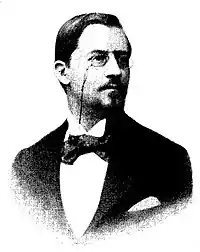
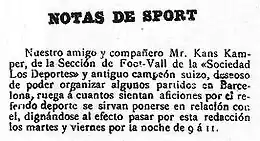
On 22 October 1899, Hans Gamper placed an advertisement in Los Deportes declaring his wish to form a football club; a positive response resulted in a meeting at the Gimnasio Solé on 29 November. Eleven players attended – Walter Wild (the first director of the club), Lluís d'Ossó, Bartomeu Terradas, Otto Kunzle, Otto Maier, Enric Ducal, Pere Cabot, Carles Pujol, Josep Llobet, John Parsons, and William Parsons – and Foot-Ball Club Barcelona was born.[18]
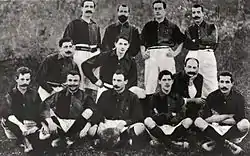
FC Barcelona had a successful start in regional and national cups, competing in the Campionat de Catalunya and the Copa del Rey. In 1902, the club won its first trophy, the Copa Macaya, and participated in the first Copa del Rey, losing 1–2 to Bizcaya in the final.[19] In 1908, Hans Gamper – now known as Joan Gamper – became club president in a desperate attempt to save Barcelona from extinction, finding the club struggling not just on the pitch, but also financially and socially, after not winning a competition since the Campionat de Catalunya in 1905. He said in a meeting, "Barcelona cannot die and must not die. If there is nobody who is going to try, then I will assume the responsibility of running the club from now on."[20] Club president on five separate occasions between 1908 and 1925, he spent 25 years in total at the helm. One of his main achievements was ensuring Barça acquire its own stadium and thus generate a stable income.[21]
On 14 March 1909, the team moved into the Camp de la Indústria, a stadium with a capacity of 8,000. To celebrate their new surroundings, the club conducted a logo contest the following year. Carles Comamala won the contest, and his suggestion became the crest that the club still wears – with some minor changes – as of the present day.[22]
With the new stadium, Barcelona participated in the inaugural version of the Pyrenees Cup, which, at the time, consisted of the best teams of Languedoc, Midi and Aquitaine (Southern France), the Basque Country and Catalonia; all were former members of the Marca Hispanica region. The contest was the most prestigious in that era.[23] From the inaugural year in 1910 to 1913, Barcelona won the competition four consecutive times. Carles Comamala played an integral part of the four-time champion, managing the side along with Amechazurra and Jack Greenwell. The latter became the club's first full-time coach in 1917.[24] The last edition was held in 1914 in the city of Barcelona, which local rivals Espanyol won.[25]
During the same period, the club changed its official language from Castilian to Catalan and gradually evolved into an important symbol of Catalan identity. For many fans, participating in the club had less to do with the game itself and more with being a part of the club's collective identity.[26] On 4 February 1917, the club held its first testimonial match to honour Ramón Torralba, who played from 1913 to 1928. The match was against local side Terrassa where Barcelona won the match 6–2.[27]
Gamper simultaneously launched a campaign to recruit more club members, and by 1922, the club had more than 20,000, who helped finance a new stadium. The club then moved to the new Les Cortes, which they inaugurated the same year.[28] Les Cortes had an initial capacity of 30,000, and in the 1940s it was expanded to 60,000.[29]
Gamper recruited Jack Greenwell as the first full-time manager in Barcelona's history. After this hiring, the club's fortunes began to improve on the field. During the Gamper-led era, Barcelona won eleven Campionats de Catalunya, six Copa del Rey and four Pyrenees Cups and enjoyed its first "golden age".[19][21]
1923–1957: Rivera, Republic and Civil War
.jpg.webp)
On 14 June 1925, in a spontaneous reaction against Primo de Rivera's dictatorship, the crowd in the stadium jeered the Royal March. As a reprisal, the ground was closed for six months and Gamper was forced to relinquish the presidency of the club.[30] This coincided with the transition to professional football, and, in 1926, the directors of Barcelona publicly claimed, for the first time, to operate a professional football club.[28]
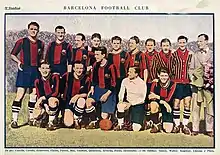
On 3 July 1927, the club held a second testimonial match for Paulino Alcántara, against the Spanish national team. To kick off the match, local journalist and pilot Josep Canudas dropped the ball onto the pitch from his aeroplane.[31] In 1928, victory in the Spanish Cup was celebrated with a poem titled "Oda a Platko", which was written by a member of the Generation of '27, Rafael Alberti, inspired by the heroic performance of the Barcelona goalkeeper, Franz Platko.[32] On 23 June 1929, Barcelona won the inaugural Spanish League. A year after winning the championship, on 30 July 1930, Gamper committed suicide after a period of depression brought on by personal and financial problems.[21]
Although they continued to have players of the standing of Josep Escolà, the club now entered a period of decline, in which political conflict overshadowed sports throughout society. Attendance at matches dropped as the citizens of Barcelona were occupied with discussing political matters.[33] Although the team won the Campionat de Catalunya in 1930, 1931, 1932, 1934, 1936 and 1938,[19] success at a national level (with the exception of the 1937 disputed title) evaded them.
A month after the Spanish Civil War began in 1936, several players from Barcelona enlisted in the ranks of those who fought against the military uprising, along with players from Athletic Bilbao.[34] On 6 August, Falangist soldiers near Guadarrama murdered club president Josep Sunyol, a representative of the pro-independence political party.[35] He was dubbed the martyr of barcelonisme, and his murder was a defining moment in the history of FC Barcelona and Catalan identity.[36] In the summer of 1937, the squad was on tour in Mexico and the United States, where it was received as an ambassador of the Second Spanish Republic. The tour led to the financial security of the club, but also resulted in half of the team seeking asylum in Mexico and France, making it harder for the remaining team to contest for trophies.[37][38]
On 16 March 1938, Barcelona came under aerial bombardment from the Italian Air Force, causing more than 3,000 deaths, with one of the bombs hitting the club's offices.[39][40] A few months later, Catalonia came under occupation and as a symbol of the "undisciplined" Catalanism, the club, now down to just 3,486 members, faced a number of restrictions. All signs of regional nationalism, including language, flag and other signs of separatism were banned throughout Spain. The Catalan flag was banned and the club were prohibited from using non-Spanish names. These measures forced the club to change its name to Club de Fútbol Barcelona and to remove the Catalan flag from its crest.[41]
In 1943, Barcelona faced rivals Real Madrid in the semi-finals of Copa del Generalísimo (now the Copa del Rey). The first match at Les Corts was won by Barcelona 3–0. Real Madrid comfortably won the second leg, beating Barcelona 11–1.[42] According to football writer Sid Lowe, "There have been relatively few mentions of the game [since] and it is not a result that has been particularly celebrated in Madrid. Indeed, the 11–1 occupies a far more prominent place in Barcelona's history. This was the game that first formed the identification of Madrid as the team of the dictatorship and Barcelona as its victims."[43] It has been alleged by local journalist Paco Aguilar that Barcelona's players were threatened by police in the changing room, though nothing was ever proven.[44]
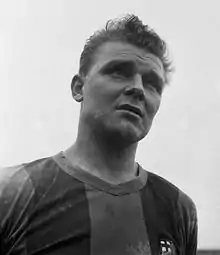
Despite the difficult political situation, CF Barcelona enjoyed considerable success during the 1940s and 1950s. In 1945, with Josep Samitier as coach and players like César, Ramallets and Velasco, they won La Liga for the first time since 1929. They added two more titles in 1948 and 1949.[45] In 1949, they also won the first Copa Latina.[46] In June 1950, Barcelona signed László Kubala, who was to be an important figure at the club.[47]
On a rainy Sunday of 1951, the crowd left Les Corts stadium after a 2–1 win against Santander by foot, refusing to catch any trams, and surprising the Francoist authorities. The reason was simple: at the same time, a tram strike was taking place in Barcelona, receiving the support of blaugrana fans. Events like this made CF Barcelona represent much more than just Catalonia and many progressive Spaniards saw the club as a staunch defender of rights and freedoms.[48][49]
Coach Ferdinand Daučík and László Kubala led the team to five different trophies including La Liga, the Copa del Generalísimo, the Copa Latina, the Copa Eva Duarte, and the Copa Martini Rossi in 1952. In 1953, the club won La Liga and the Copa del Generalísimo again.[29]
1957–1978: Club de Fútbol Barcelona
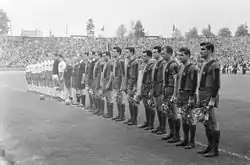
With Helenio Herrera as coach, a young Luis Suárez, the European Footballer of the Year in 1960, and two influential Hungarians recommended by Kubala, Sándor Kocsis and Zoltán Czibor, the team won another national double in 1959 and a La Liga and Fairs Cup double in 1960. In 1961, they became the first club to beat Real Madrid in a European Cup play-off. However, they lost 2–3 to Benfica in the final.[50][51]
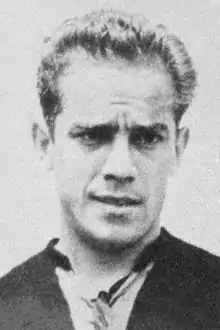
The 1960s were less successful for the club, with Real Madrid monopolising La Liga. The completion of the Camp Nou, finished in 1957, meant the club had little money to spend on new players.[51] The 1960s saw the emergence of Josep Maria Fusté and Carles Rexach, and the club won the Copa del Generalísimo in 1963 and the Fairs Cup in 1966. Barcelona restored some pride by beating Real Madrid 1–0 in the 1968 Copa del Generalísimo final at the Santiago Bernabéu in front of Francisco Franco, with coach Salvador Artigas, a former republican pilot in the Civil War. With the end of Franco's dictatorship in 1974, the club changed its official name back to Futbol Club Barcelona and reverted the crest to its original design, including the original letters once again.[52][53]
The 1973–74 season saw the arrival of Johan Cruyff, who was bought for a world record £920,000 from Ajax.[54] Already an established player with Ajax, Cruyff quickly won over the Barcelona fans when he told the European press that he chose Barcelona over Real Madrid because he could not play for a club associated with Francisco Franco. He further endeared himself when he named his son "Jordi", after the local Catalan Saint George.[55] Next to champions like Juan Manuel Asensi, Carles Rexach and Hugo Sotil, he helped the club win the 1973–74 season for the first time since 1960,[19] defeating Real Madrid 5–0 at the Santiago Bernabéu en route. He was crowned European Footballer of the Year in 1973 during his first season with Barcelona (his second Ballon d'Or win; he won his first while playing for Ajax in 1971). Cruyff received this prestigious award a third time (the first player to do so) in 1974, while he was still with Barcelona.[56]
1978–2000: Núñez and stabilization
In 1978, Josep Lluís Núñez became the first elected president of FC Barcelona, and, since then, the members of Barcelona have elected the club president. The process of electing a president of FC Barcelona was closely tied to Spain's transition to democracy in 1974 and the end of Franco's dictatorship. The new president's main objective was to develop Barcelona into a world-class club by giving it stability both on and off the pitch. His presidency was to last for 22 years, and it deeply affected the image of Barcelona, as Núñez held to a strict policy regarding wages and discipline, letting go of such players as Diego Maradona, Romário and Ronaldo rather than meeting their demands.[59][60]
On 16 May 1979, the club won its first European Cup Winners' Cup by beating Fortuna Düsseldorf 4–3 in Basel in a final watched by more than 30,000 travelling blaugrana fans. The same year, Núñez began to invest in the club's youth programme by converting La Masia into a dormitory for young academy players from abroad. The name of the dormitory would later become synonymous with the youth programme of Barcelona.[61]
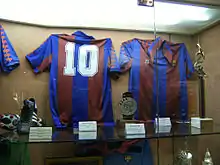
In June 1982, Diego Maradona was signed for a world record fee of £5 million from Boca Juniors.[62] In the following season, under coach César Luis Menotti, Barcelona won the Copa del Rey, beating Real Madrid. Maradona's time with Barcelona, however, was short-lived and he soon left for Napoli. At the start of the 1984–85 season, Terry Venables was hired as manager and he won La Liga with noteworthy displays by German midfielder Bernd Schuster. The next season, he took the team to their second European Cup final, only to lose on penalties to Steaua București during a dramatic evening in Seville.[59]
Around this time, tensions began to arise between what was perceived as president Núñez's dictatorial rule and the nationalistic support group, Boixos Nois. The group, identified with a left-wing separatism, repeatedly demanded the resignation of Núñez and openly defied him through chants and banners at matches. At the same time, Barcelona experienced an eruption in skinheads, who often identified with a right-wing separatism. The skinheads slowly transferred the Boixos Nois' ideology from liberalism to fascism, which caused division within the group and a sudden support for Núñez's presidency.[63] Inspired by British hooligans, the remaining Boixos Nois became violent, causing havoc leading to large-scale arrests.[64]
After the 1986 FIFA World Cup, Barcelona signed the English top scorer Gary Lineker, along with goalkeeper Andoni Zubizarreta, but the team could not achieve success, as Schuster was excluded from the team. Terry Venables was subsequently fired at the beginning of the 1987–88 season and replaced with Luis Aragonés. The season finished with the players rebelling against president Núñez, in an event known as the Hesperia mutiny, and a 1–0 victory in the Copa del Rey final against Real Sociedad.[59]
The Dream Team era
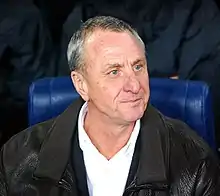
In 1988, Johan Cruyff returned to the club, this time as manager and he assembled what would later be dubbed the "Dream Team".[65] He used a mix of Spanish players like Pep Guardiola, José Mari Bakero, Jon Andoni Goikoetxea, Miguel Angel Nadal and Txiki Begiristain while signing international players such as Ronald Koeman, Michael Laudrup, Romário and Hristo Stoichkov.[66]
It was ten years after the inception of the youth programme, La Masia, when the young players began to graduate and play for their first team. One of the first graduates, who would later earn international acclaim, was future Barcelona coach Pep Guardiola.[67] Under Cruyff's guidance, Barcelona won four consecutive La Liga titles from 1991 to 1994. They beat Sampdoria in both the 1989 UEFA Cup Winners' Cup final and the 1992 European Cup final at Wembley, with a free kick goal from Dutch international Ronald Koeman. They also won a Copa del Rey in 1990, the European Super Cup in 1992 and three Supercopa de España trophies. With 11 trophies, Cruyff became the club's most successful manager at that point. He also became the club's longest consecutive serving manager, serving eight years.[68] Cruyff's fortune was to change, and, in his final two seasons, he failed to win any trophies and fell out with president Josep Lluís Núñez, resulting in his departure.[59] On the legacy of Cruyff's football philosophy and the passing style of play he introduced to the club, future coach of Barcelona Pep Guardiola would state, "Cruyff built the cathedral, our job is to maintain and renovate it."[69]
Reacting to Cruyff's departure, an independent protest group was organised by Armand Caraben, Joan Laporta and Alfons Godall.[70] The objective of the group, called L'Elefant Blau, was to oppose the presidency of Núñez, which they regarded as a corruption of the club's traditional values.[70][71] Laporta would later take over the presidency of Barcelona in 2003.[72]
Cruyff was briefly replaced by Bobby Robson, who took charge of the club for a single season in 1996–97. He recruited Ronaldo for a world record transfer fee from his previous club, PSV and delivered a cup treble, winning the Copa del Rey, UEFA Cup Winners' Cup and the Supercopa de España, with Ronaldo registering 47 goals in 49 games.[73] Despite his success, Robson was only ever seen as a short-term solution while the club waited for Louis van Gaal to become available.[74]
Like Maradona, Ronaldo only stayed a short time before he left for Inter Milan in another world record transfer.[73] However, new heroes emerged, such as Luís Figo, Patrick Kluivert, Luis Enrique and Rivaldo, and the team won a Copa del Rey and La Liga double in 1998. In 1999, the club celebrated its centenari, winning the Primera División title, and Rivaldo became the fourth Barcelona player to be awarded European Footballer of the Year. Despite this domestic success, the failure to emulate Real Madrid in the Champions League led to van Gaal and Núñez resigning in 2000.[74]
2000–2008: Exit Núñez, enter Laporta
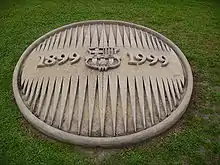
The departures of Núñez and Van Gaal were hardly noticed by the fans when compared to that of Luís Figo, then club vice-captain. Figo had become a cult hero and was considered by Catalans to be one of their own. Barcelona fans, however, were distraught by Figo's decision to join arch-rivals Real Madrid, and, during subsequent visits to the Camp Nou, Figo was given an extremely hostile reception. Upon his first return, a piglet's head and a full bottle of whiskey were thrown at him from the crowd.[75] The next three years saw the club in decline, and managers came and went. Van Gaal was replaced by Lorenzo Serra Ferrer who, despite an extensive investment in players in the summer of 2000, presided over a mediocre league campaign and a first-round Champions League exit, and was dismissed late in the season. Long-serving Barcelona deputy coach Carles Rexach was appointed as his replacement, initially on a temporary basis, and managed to at least steer the club to the last Champions League spot on the final day of the season against Valencia via an exceptional performance from Rivaldo, who completed arguably the greatest hat-trick in history with an overhead bicycle kick winner in the final minute to secure qualification.[76][77][78]
Despite better form in La Liga and a good run to the semi-finals of the Champions League, Rexach was never viewed as a long-term solution and that summer Van Gaal returned to the club for a second spell as manager. What followed, despite another decent Champions League performance, was one of the worst La Liga campaigns in the club's history, with the team as low as 15th in February 2003. This led to Van Gaal's resignation and replacement for the rest of the campaign by Radomir Antić, though a sixth-place finish was the best that he could manage. At the end of the season, Antić's short-term contract was not renewed, and club president Joan Gaspart resigned, his position having been made completely untenable by such a disastrous season on top of the club's overall decline in fortunes since he became president three years prior.[79]
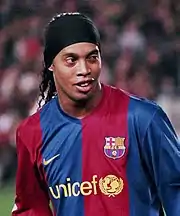
After the disappointment of the Gaspart era, the combination of a new young president, Joan Laporta, and a young new manager, former Dutch and Milan star Frank Rijkaard, saw the club bounce back. On the field, an influx of international players, including Ronaldinho, Deco, Henrik Larsson, Ludovic Giuly, Samuel Eto'o, Rafael Márquez and Edgar Davids, combined with home grown Spanish players, such as Carles Puyol, Andrés Iniesta, Xavi and Víctor Valdés, led to the club's return to success. Barcelona won La Liga and the Supercopa de España in 2004–05, and Ronaldinho and Eto'o were voted first and third, respectively, in the FIFA World Player of the Year awards.[82]
In the 2005–06 season, Barcelona repeated their league and Supercopa successes. The pinnacle of the league season arrived at the Santiago Bernabéu in a 3–0 win over Real Madrid. It was Rijkaard's second victory at the Bernabéu, making him the first Barcelona manager to win there twice. Ronaldinho's performance was so impressive that after his second goal, which was Barcelona's third, some Real Madrid fans gave him a standing ovation.[83] In the Champions League, Barcelona beat the English club Arsenal in the final. Trailing 1–0 to a ten-man Arsenal and with less than 15 minutes remaining, they came back to win 2–1, with substitute Henrik Larsson, in his final appearance for the club, setting up goals for Samuel Eto'o and fellow substitute Juliano Belletti, for the club's first European Cup victory in 14 years.[84]
Despite being the favourites and starting strongly, Barcelona finished the 2006–07 season without trophies. A pre-season US tour was later blamed for a string of injuries to key players, including leading scorer Eto'o and rising star Lionel Messi. There was open feuding as Eto'o publicly criticised coach Rijkaard and Ronaldinho.[85] Ronaldinho also admitted that a lack of fitness affected his form.[86] In La Liga, Barcelona were in first place for much of the season, but inconsistency in the New Year saw Real Madrid overtake them to become champions. Barcelona advanced to the semi-finals of the Copa del Rey, winning the first leg against Getafe 5–2, with a goal from Messi bringing comparison to Diego Maradona's goal of the century, but then lost the second leg 4–0. They took part in the 2006 FIFA Club World Cup, but were beaten by a late goal in the final against Brazilian side Internacional.[87] In the Champions League, Barcelona were knocked out of the competition in the last 16 by eventual runners-up Liverpool on away goals.[88]
Barcelona finished the 2007–08 season third in La Liga and reached the semi-finals of the UEFA Champions League and Copa del Rey, both times losing to the eventual champions, Manchester United and Valencia, respectively. The day after a 4–1 defeat to Real Madrid, Joan Laporta announced that Barcelona B coach Pep Guardiola would take over Frank Rijkaard's duties on 30 June 2008.[89]
2008–2012: Guardiola era
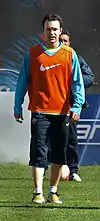
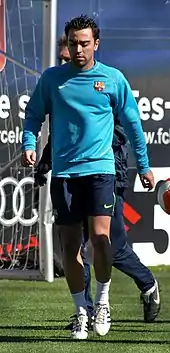
Barcelona B youth manager Pep Guardiola took over Frank Rijkaard's duties at the conclusion of the season.[89] Guardiola brought with him the now famous tiki-taka style of play he had been taught during his time in the Barcelona youth teams. In the process, Guardiola sold Ronaldinho and Deco and started building the Barcelona team around Xavi, Andrés Iniesta and Lionel Messi.
Barça beat Athletic Bilbao 4–1 in the 2009 Copa del Rey Final, winning the competition for a record-breaking 25th time. A historic 2–6 victory against Real Madrid followed three days later and ensured that Barcelona became 2008–09 La Liga champions. Barça finished the season by beating Manchester United 2–0 at the Stadio Olimpico in Rome, with goals from Eto'o and Messi, to win their third Champions League title, and complete the first ever treble won by a Spanish team.[91][92][93] The team went on to win the 2009 Supercopa de España against Athletic Bilbao[94] and the 2009 UEFA Super Cup against Shakhtar Donetsk,[95] becoming the first European club to win both domestic and European Super Cups following a treble. In December 2009, Barcelona won the 2009 Club World Cup.[96] Barcelona accomplished two new records in Spanish football in 2010 as they retained the La Liga trophy with 99 points and won the Supercopa de España for a ninth time.[97][98]
After Laporta's departure from the club in June 2010, Sandro Rosell was soon elected as the new president. The elections were held on 13 June, where he got 61.35% (57,088 votes, a record) of total votes.[99] Rosell signed David Villa from Valencia for €40 million[100] and Javier Mascherano from Liverpool for €19 million.[101] At the 2010 World Cup in South Africa, Barcelona players that had graduated from the club's La Masia youth system would play a major role in Spain becoming world champions. On 11 July, seven players who came through the academy participated in the final, six of which were Barcelona players whom started the match, with Iniesta scoring the winning goal against the Netherlands.[102]
In November 2010, Barcelona defeated their main rival Real Madrid 5–0 in El Clásico. At the ceremony for the 2010 FIFA Ballon d'Or in December, Barcelona's La Masia became the first youth academy ever to have all three finalists for the Ballon d'Or, with Messi, Iniesta and Xavi being named the three best players in the world for 2010.[103] In the 2010–11 season, Barcelona retained the La Liga trophy, their third title in succession, finishing with 96 points.[104] In April 2011, the club reached the Copa del Rey final, losing 1–0 to Real Madrid at the Mestalla Stadium in Valencia.[105] In May, Barcelona defeated Manchester United in the 2011 Champions League final 3–1 held at Wembley Stadium, a repeat of the 2009 final, winning their fourth European Cup.[106] In August 2011, La Masia graduate Cesc Fàbregas was bought from Arsenal and he would help Barcelona defend the Spanish Supercup against Real Madrid. The Supercup victory brought the total number of official trophies to 73, matching the number of titles won by Real Madrid.[107]
Later the same month, Barcelona won the UEFA Super Cup defeating Porto 2–0 with goals from Messi and Fàbregas. This extended the club's overall number of official trophies to 74, surpassing Real Madrid's total amount of official trophies.[108] The Super Cup victory also saw Guardiola win his 12th trophy out of a possible 15 in his three years at the helm of the club, becoming the all-time record holder of most titles won as a coach at Barcelona.[109]
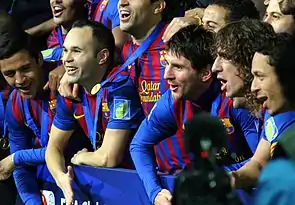
In December, Barcelona won the Club World Cup for a record second time since its establishment, after defeating 2011 Copa Libertadores holders Santos 4–0 in the final thanks to two goals from Messi and goals from Xavi and Fàbregas.[110] As a result, the overall trophy haul during the reign of Guardiola was further extended and saw Barcelona win their 13th trophy out of a possible 16.[111][112] Considered by some in the sport to be the greatest team of all time, with Manchester United manager Alex Ferguson stating, ”They mesmerise you with their passing”,[13] their five trophies in 2011 saw them receive the Laureus World Sports Award for Team of the Year.[113]
In the 2011–12 season, Barcelona lost the semi-finals of the Champions League against Chelsea. Guardiola, who had been on a rolling contract and had faced criticism over his recent tactics and squad selections,[114][115] announced that he would step down as manager on 30 June and be succeeded by assistant Tito Vilanova.[116][117] Guardiola finished his tenure with Barça winning the Copa del Rey final 3–0, bringing the tally to 14 trophies that Barça had won under his coaching.[118]
It was announced in summer of 2012 that Tito Vilanova, assistant manager at Barcelona, would take over from Pep Guardiola as manager. Following his appointment, Barcelona went on an incredible run that saw them hold the top spot on the league table for the entire season, recording only two losses and amassing 100 points. Their top scorer once again was Lionel Messi, who scored 46 goals in La Liga, including two hat-tricks. On 11 May 2013, Barcelona were crowned as the Spanish football champions for the 22nd time, still with four games left to play. Ultimately, Barcelona ended the season 15 points clear of rivals Real Madrid, despite losing 2–1 to them at the beginning of March.[119] They reached the semi-final stage of both the Copa del Rey and the Champions League, going out to Real Madrid and Bayern Munich respectively. On 19 July, it was announced that Vilanova was resigning as Barcelona manager because his throat cancer had returned, and he would be receiving treatment for the second time after a three-month medical leave in December 2012.[120]
2014–2020: Bartomeu era
On 22 July 2013, Gerardo "Tata" Martino was confirmed as manager of Barcelona for the 2013–14 season.[121] Barcelona won the 2013 Supercopa de España 1–1 on away goals. On 23 January 2014, Sandro Rosell resigned as president by the admissibility of the complaint for alleged misappropriation following the transfer of Neymar. Josep Maria Bartomeu replaced him to finish the term in 2016.
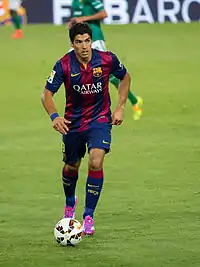
On 17 May, in a game where they needed to defeat Atlético Madrid (who had eliminated them from the Champions League in the quarter-finals earlier in the year) to be crowned champions of La Liga for the 23rd time, they drew after Atlético defender Diego Godín headed in the equaliser in the 49th minute, giving Atlético the championship.[122]
Barcelona won the treble in the 2014–15 season, winning La Liga, Copa del Rey and Champions League titles, and became the first European team to have won the treble twice.[123] On 17 May, the club clinched their 23rd La Liga title after defeating Atlético Madrid.[124] This was Barcelona's seventh La Liga title in the last ten years.[125] On 30 May, the club defeated Athletic Bilbao in the Copa del Rey final at Camp Nou.[126] On 6 June, Barcelona won the Champions League final with a 3–1 win against Juventus, which completed the treble, the club's second in six years.[127] Barcelona's attacking trio of Messi, Suárez and Neymar, dubbed "MSN", scored 122 goals in all competitions, the most in a season for an attacking trio in Spanish football history.[128]
On 11 August, Barcelona started the 2015–16 season winning a joint record fifth European Super Cup by beating Sevilla 5–4 in the 2015 UEFA Super Cup. They ended the year with a 3–0 win over Argentine club River Plate in the 2015 Club World Cup final on 20 December to win the trophy for a record third time, with Suárez, Messi and Iniesta the top three players of the tournament.[129] The Club World Cup was Barcelona's 20th international title, a record only matched by Egyptian club Al Ahly.[130][131] By scoring 180 goals in 2015 in all competitions, Barcelona set the record for most goals scored in a calendar year, breaking Real Madrid's record of 178 goals scored in 2014.[132]
On 10 February 2016, qualifying for the sixth Copa del Rey final in the last eight seasons, Luis Enrique's Barcelona broke the club's record of 28 consecutive games unbeaten in all competitions set by Guardiola's team in the 2010–11 season, with a 1–1 draw with Valencia in the second leg of the 2015–16 Copa del Rey.[133][134] With a 5–1 win at Rayo Vallecano on 3 March, Barcelona's 35th match unbeaten, the club broke Real Madrid's Spanish record of 34 games unbeaten in all competitions from the 1988–1989 season.[135][136] After Barça reached 39 matches unbeaten, their run ended on 2 April 2016 with a 2–1 defeat to Real Madrid at Camp Nou.[137] On 14 May 2016, Barcelona won their sixth La Liga title in eight seasons.[138] The front three of Messi, Suárez and Neymar finished the season with 131 goals, breaking the record they had set the previous year for most goals by an attacking trio in a single season.[139] On 8 March 2017, Barcelona made the largest comeback in Champions League history in the 2016–17 UEFA Champions League Round of 16 second Leg, defeating Paris Saint-Germain 6–1 (aggregate score 6–5), despite losing the first leg in France by a score of 4–0.[140] On 29 May 2017, former player Ernesto Valverde was named as Luis Enrique's successor signing a two-year contract with an option for a further year.[141]
On 20 September 2017, Barcelona issued a statement exercising their stance on the 2017 Catalan referendum saying, "FC Barcelona, in holding the utmost respect for its diverse body of members, will continue to support the will of the majority of Catalan people, and will do so in a civil, peaceful, and exemplary way".[142] The match against UD Las Palmas on the referendum day was requested to be postponed by the Barcelona board due to heavy violence in Catalonia, but it (the request) was declined by La Liga, therefore being held behind closed doors.[143] Two directors, Jordi Monés and Carles Vilarrubí, handed in their resignations in protest at the game's being played.[144] Winning La Liga for the 2017–18 season, on 9 May 2018, Barcelona defeated Villarreal 5–1 to set the longest unbeaten streak (43 games) in La Liga history.[145] On 27 April 2019, Barcelona won their 26th La Liga title.[146] However, the La Liga title was overshadowed by an improbable Champions League exit to Liverpool in the semi-finals, with Barça losing the second leg 0–4 after being up 3–0 after a home victory.[147]
On 13 January 2020, former Real Betis coach Quique Setién replaced Ernesto Valverde as the new head coach of Barcelona, following the loss to Atlético Madrid in the Spanish Supercup.[148] Barcelona were leading the league when the coronavirus outbreak halted the competition, but their performance fell off and ultimately they lost the league title to Real Madrid on 16 July, with just one game to spare.[149] Despite losing out on the league title, there was still hope for the Catalans in the Champions League, as they beat Napoli 3–1 in the second leg of the round of sixteen, this meant that they would play Bayern Munich, who beat Chelsea in the round of 16.[150] However, Barça suffered what was described by pundits and fans alike as an "absolute humiliation" against the German side, losing 2–8 in the one-legged tie and suffering one of their worst defeats in history. The result meant that Barça failed to reach the Champions League final for the fifth time in a row, once advancing to the semi-finals and being eliminated at the quarter-final stage four times.[151] On 17 August, the club confirmed that Setién had been removed from his position as manager,[152] with director of football Eric Abidal also dismissed from his position.[153] Two days later, Ronald Koeman was appointed as the new head coach of Barcelona.[154] On 27 October, Josep Maria Bartomeu announced his resignation as president and that of the rest of the Board of Directors.[155]
Support
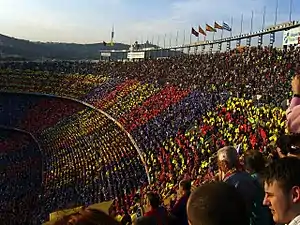
The nickname culé for a Barcelona supporter is derived from the Catalan cul (English: arse), as the spectators at the first stadium, Camp de la Indústria, sat with their culs over the stand. In Spain, about 25% of the population is said to be Barça sympathisers, second behind Real Madrid, supported by 32% of the population.[156] Throughout Europe, Barcelona is the favourite second-choice club.[157] The club's membership figures have seen a significant increase from 100,000 in the 2003–04 season to 170,000 in September 2009,[158] the sharp rise being attributed to the influence of Ronaldinho and then-president Joan Laporta's media strategy that focused on Spanish and English online media.[159][160]
In addition to membership, as of 2015 there are 1,267 officially registered fan clubs, called penyes, around the world.[161] The fan clubs promote Barcelona in their locality and receive beneficial offers when visiting Barcelona.[162] Among the best supported teams globally, Barcelona has the second highest social media following in the world among sports teams, with over 103 million Facebook fans as of December 2017, just behind Real Madrid.[9][163] The club has had many prominent people among its supporters, including Pope John Paul II, who was an honorary member, and former prime minister of Spain José Luis Rodríguez Zapatero.[164][165]
Club rivalries
El Clásico
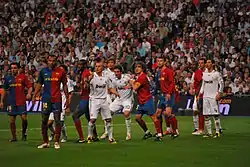
There is often a fierce rivalry between the two strongest teams in a national league, and this is particularly the case in La Liga, where the game between Barcelona and Real Madrid is known as "The Classic" (El Clásico). From the start of national competitions the clubs were seen as representatives of two rival regions in Spain: Catalonia and Castile, as well as of the two cities. The rivalry reflects what many regard as the political and cultural tensions felt between Catalans and the Castilians, seen by one author as a re-enactment of the Spanish Civil War.[166] Over the years, the record for Real Madrid and Barcelona is 97 victories for Madrid, 96 victories for Barcelona, and 51 draws.[167]
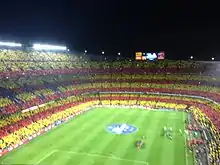
During the dictatorships of Miguel Primo de Rivera (1923–1930) and especially of Francisco Franco (1939–1975), all regional cultures were suppressed. All of the languages spoken in Spanish territory, except Spanish (Castilian) itself, were officially banned.[168][169] Symbolising the Catalan people's desire for freedom, Barça became 'More than a club' (Més que un club) for the Catalans.[170] According to Manuel Vázquez Montalbán, the best way for the Catalans to demonstrate their identity was by joining Barça. It was less risky than joining a clandestine anti-Franco movement, and allowed them to express their dissidence.[171] During Franco's regime, however, the blaugrana team was granted profit due to its good relationship with the dictator at management level, even giving two awards to him.[172]
On the other hand, Real Madrid was widely seen as the embodiment of the sovereign oppressive centralism and the fascist regime at management level and beyond: Santiago Bernabéu, the former club president for whom their stadium is named, fought on the Nationalist side during the Spanish Civil War.[173][174] During the Spanish Civil War, however, members of both clubs such as Josep Sunyol and Rafael Sánchez Guerra suffered at the hands of Franco supporters.[175]
During the 1950s, the rivalry was exacerbated further when there was a controversy surrounding the transfer of Alfredo Di Stéfano, who finally played for Real Madrid and was key to their subsequent success.[176] The 1960s saw the rivalry reach the European stage when they met twice in a controversial knock-out round of the European Cup, with Madrid receiving unfavourable treatment from the referee.[177][178] In 2002, the European encounter between the clubs was dubbed the "Match of The Century" by Spanish media, and Madrid's win was watched by more than 500 million people.[179] An intense fixture which is marked by its indiscipline in addition to memorable goal celebrations from both teams – often involving mocking the opposition – such notable celebrations occurred in 2009 when Barcelona captain Carles Puyol kissed his Catalan armband in front of incensed Madrid fans at the Santiago Bernabéu Stadium and in 2017 when Lionel Messi celebrated his 93rd-minute winner for Barcelona against Real Madrid at the Bernabéu by taking off his Barcelona shirt and holding it up to incensed Real Madrid fans – with his name and number facing them.[180]
El derbi Barceloní
_(58)_(142178805).jpg.webp)
Barça's local rival has always been Espanyol. Blanc-i-blaus, being one of the clubs granted royal patronage, was founded exclusively by Spanish football fans, unlike the multinational nature of Barça's primary board. The founding message of the club was clearly anti-Barcelona, and they disapprovingly saw FC Barcelona as a team of foreigners.[181] The rivalry was strengthened by what Catalonians saw as a provocative representative of Madrid.[182] Their original ground was in the affluent district of Sarrià.[183][184]
Traditionally, Espanyol was seen by the vast majority of Barcelona's citizens as a club which cultivated a kind of compliance to the central authority, in stark contrast to Barça's revolutionary spirit.[185] Also in the 1960s and 1970s, while FC Barcelona acted as an integrating force for Catalonia's new arrivals from poorer regions of Spain expecting to find a better life, Espanyol drew their support mainly from sectors close to the regime such as policemen, military officers, civil servants and career fascists.[186]
In 1918, Espanyol started a counter-petition against autonomy, which at that time had become a pertinent issue.[181] Later on, an Espanyol supporter group would join the Falangists in the Spanish Civil War, siding with the fascists. Despite these differences in ideology, the derbi has always been more relevant to Espanyol supporters than Barcelona ones due to the difference in objectives. In recent years the rivalry has become less political, as Espanyol translated its official name and anthem from Spanish to Catalan.[181]
Though it is the most played local derby in the history of La Liga, it is also the most unbalanced, with Barcelona overwhelmingly dominant. In the primera división league table, Espanyol has only managed to end above Barça on three occasions from 81 seasons (1928–2016) and the only all-Catalan Copa del Rey final was won by Barça in 1957. Espanyol has the consolation of achieving the largest margin win with a 6–0 in 1951, while Barcelona's biggest win was 5–0 on six occasions (in 1933, 1947, 1964, 1975, 1992 and 2016). Espanyol achieved a 2–1 win against Barça during the 2008–09 season, becoming the first team to defeat Barcelona at Camp Nou in their treble-winning season.[187]
Rivalry with A.C. Milan
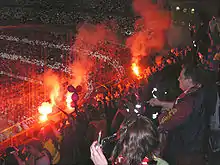
Barcelona's rival in European football is Italian club A.C. Milan.[188][189][190][191] The team against which Barcelona has played the most matches (19), it is also the second most played match in European competitions, tied with Real Madrid–Juventus and both after Real Madrid–Bayern Munich (24).[192][193] Two of the most successful clubs in Europe, Milan has won seven European Cups to Barça's five, while both clubs have won a record five European Super Cups.[194] Barcelona and Milan have won other continental titles, which make them the second and third most decorated teams in world football, with 20 and 18 titles respectively, both behind Real Madrid's 27.[195]
Barcelona leads the head-to-head record with eight wins and five defeats. The first encounter between the two clubs was in the 1959–60 European Cup. They faced off in the round of 16 and Barça won the tie on a 7–1 aggregate score (0–2 in Milan and 5–1 in Barcelona).[196] While Milan had never knocked Barcelona out of the European Cup, they beat Johan Cruyff's Dream Team 4–0 in the 1994 Champions League final, despite being the underdogs.[197][198] In 2013, however, Barcelona made a "historic" comeback from a 0–2 first leg defeat in the round of 16 of the 2012–13 Champions League, winning 4–0 at the Camp Nou.[199][200]
Ownership and finances
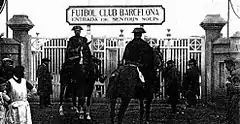
Along with Real Madrid, Athletic Bilbao, and Osasuna, Barcelona is organised as a registered association. Unlike a limited company, it is not possible to purchase shares in the club, but only membership.[201] The members of Barcelona, called socis, form an assembly of delegates which is the highest governing body of the club.[202] As of 2016, the club has 140,000 socis.[203]
In 2010, Forbes evaluated Barcelona's worth to be around €752 million (US$1 billion), ranking them fourth after Manchester United, Real Madrid and Arsenal, based on figures from the 2008–09 season.[204][205] According to Deloitte, Barcelona had a recorded revenue of €366 million in the same period, ranking second to Real Madrid, who generated €401 million in revenue.[206] In 2013, Forbes magazine ranked Barcelona the third most valuable sports team in the world, behind Real Madrid and Manchester United, with a value of $2.6 billion.[207] In 2014, Forbes ranked them the second most valuable sports team in the world, worth $3.2 billion, and Deloitte ranked them the world's fourth richest football club in terms of revenue, with an annual turnover of €484.6 million.[208][209] In 2017, Forbes ranked them the fourth most valuable sports team in the world with a team value of $3.64 billion.[210] The world's highest paid sports team, in November 2018 Barcelona became the first sports team with average first-team pay in excess of £10m ($13.8m) per year.[15][16]
Records
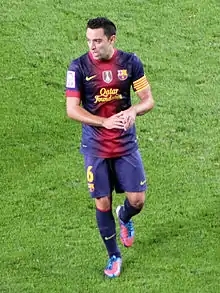
Xavi presently holds the club record for number of total games played (767) and the record number of La Liga appearances (505). Lionel Messi comes second with 757 appearances in all competitions and 504 in the league.[211]
.jpg.webp)
Barcelona's all-time highest goalscorer in all competitions is Lionel Messi with 651 goals, surpassing Paulino Alcántara's 369 goals in March 2014, a record which stood for 87 years.[212] In December 2020 Messi also overtook Pelé’s 643 goals for Santos to become the highest scorer for a single club.[213] Messi is the record goalscorer for Barcelona in European and international club competitions,[214] and the record league scorer with 457 goals in La Liga. Four other players have managed to score over 100 league goals for Barcelona: César (190), Luis Suárez (147), László Kubala (131) and Samuel Eto'o (108). Josep Samitier is the club's highest goalscorer in the Copa del Rey, with 65 goals.
László Kubala holds the La Liga record for most goals scored in one match, with seven goals against Sporting Gijón in 1952.[215] Lionel Messi co-holds the Champions League record with five goals against Bayer Leverkusen in 2012.[216] Eulogio Martínez became Barça's top goalscorer in a cup game, when he scored seven goals against Atlético Madrid in 1957.[214]
Barcelona goalkeepers have won a record number of Zamora trophies (20), with Antoni Ramallets and Víctor Valdés winning a record five each. Valdés had a ratio of 0.832 goals-conceded-per-game, a La Liga record,[217] and he also holds the record for longest period without conceding a goal (896 minutes) in all competitions for Barcelona.[218] Claudio Bravo has the record of best unbeaten start in a season in La Liga history, at 754 minutes.[219][220]
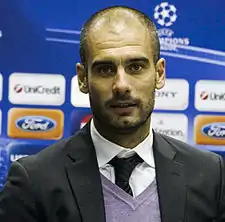
Barcelona's longest serving manager is Jack Greenwell, with nine years in two spells (1917–1924) and (1931–1933), and Pep Guardiola is the club's most successful manager (14 trophies in 4 years). The most successful Barcelona player is Lionel Messi with 34 trophies, surpassing Andrés Iniesta, with 32 trophies.[221]
Barcelona's Camp Nou is the largest stadium in Europe. The club's highest home attendance was 120,000 in a European Cup quarter-final against Juventus on 3 March 1986.[222] The modernisation of Camp Nou during the 1990s and the introduction of all-seater stands means the record will not be broken for the foreseeable future as the current capacity of the stadium is 99,354.[223]
El Barça de les Cinc Copes is the first team in Spanish football to have won five trophies in a single season (1951–1952).[224][225][226] Barcelona is the only club to have played in every season of European competitions since they started in 1955 counting non-UEFA competition Inter-Cities Fairs Cup.[227][228] On 18 December 2009, alongside being the only Spanish club to achieve the continental treble, Barcelona became the first ever football team to complete the sextuple.[229][230] In January 2018, Barcelona signed Philippe Coutinho from Liverpool for €120 million, the highest transfer fee in club's history.[231][232] In August 2017, Barcelona player Neymar transferred to Paris Saint-Germain for a world record transfer fee of €222 million.[233][234]
In 2016, Barcelona's La Masia was ranked second by the International Centre for Sports Studies (CIES) as the most top-level players producing academy in the world.[235]
Kits and crest
| Wikimedia Commons has media related to FC Barcelona kits. |
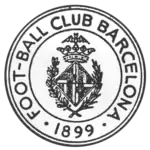
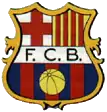
The club's original crest was a quartered diamond-shaped crest topped by the Crown of Aragon and the bat of King James, and surrounded by two branches, one of a laurel tree and the other a palm.[22] The club shared Barcelona's coat of arms, as a demonstration of its identification with the city and a desire to be recognised as one.[236] In 1910, the club held a competition among its members to design a new crest. The winner was Carles Comamala, who at the time played for the club. Comamala's suggestion became the crest that the club wears today, with some minor variations. The crest consists of the St George Cross in the upper-left corner with the Catalan flag beside it, and the team colours at the bottom.[22]
The blue and red colours of the shirt were first worn in a match against Hispania in 1900.[237] Several competing theories have been put forth for the blue and red design of the Barcelona shirt. The son of the first president, Arthur Witty, claimed it was the idea of his father as the colours were the same as the Merchant Taylor's School team. Another explanation, according to author Toni Strubell, is that the colours are from Robespierre's First Republic. In Catalonia the common perception is that the colours were chosen by Joan Gamper and are those of his home team, FC Basel.[238]
Since 1998, the club has had a kit deal with Nike. In 2016, the deal was renewed until 2028, for a record €155 million per year but the contract includes a clause sanctioning penalty or agreement termination anytime if Barcelona fail to qualify for the European competitions or is relegated from La Liga.[239][240]
The first kit worn by the club in 1899[241] |
Traditional Barcelona uniform since the 1920s[242] |
The club used horizontal stripes only during the 2015–16 season.[243] |
The club used a checkered design only during the 2019–20 season.[244] |
Stadium
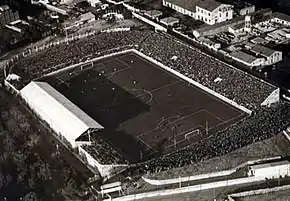
Barcelona initially played in the Camp de la Indústria. The capacity was about 6,000, and club officials deemed the facilities inadequate for a club with growing membership.[245]
In 1922, the number of supporters had surpassed 20,000 and by lending money to the club, Barça was able to build the larger Camp de Les Corts, which had an initial capacity of 20,000 spectators. After the Spanish Civil War the club started attracting more members and a larger number of spectators at matches. This led to several expansion projects: the grandstand in 1944, the southern stand in 1946, and finally the northern stand in 1950. After the last expansion, Les Corts could hold 60,000 spectators.[246]
After the construction was complete there was no further room for expansion at Les Corts. Back-to-back La Liga titles in 1948 and 1949 and the signing of László Kubala in June 1950, who would later go on to score 196 goals in 256 matches, drew larger crowds to the games.[246][247][248] The club began to make plans for a new stadium.[246] The building of Camp Nou commenced on 28 March 1954, before a crowd of 60,000 Barça fans. The first stone of the future stadium was laid in place under the auspices of Governor Felipe Acedo Colunga and with the blessing of Archbishop of Barcelona Gregorio Modrego. Construction took three years and ended on 24 September 1957 with a final cost of 288 million pesetas, 336% over budget.[246]
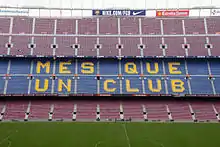
In 1980, when the stadium was in need of redesign to meet UEFA criteria, the club raised money by offering supporters the opportunity to inscribe their name on the bricks for a small fee. The idea was popular with supporters, and thousands of people paid the fee. Later this became the centre of controversy when media in Madrid picked up reports that one of the stones was inscribed with the name of long-time Real Madrid chairman and Franco supporter Santiago Bernabéu.[249][250][251] In preparation for the 1992 Summer Olympics two tiers of seating were installed above the previous roofline.[252] It has a current capacity of 99,354 making it the largest stadium in Europe.[1]
There are also other facilities, which include:[253]
- Ciutat Esportiva Joan Gamper (FC Barcelona's training ground)
- Masia-Centre de Formació Oriol Tort (Residence of young players)
- Estadi Johan Cruyff (Home of the reserve team and women's team)
- Palau Blaugrana (FC Barcelona indoor sports arena)
- Palau Blaugrana 2 (Secondary indoor arena of FC Barcelona)
- Palau de Gel (FC Barcelona ice rink)
Honours
| Type | Competition | Titles | Seasons |
|---|---|---|---|
| Domestic | La Liga | 26 | 1929, 1944–45, 1947–48, 1948–49, 1951–52, 1952–53, 1958–59, 1959–60, 1973–74, 1984–85, 1990–91, 1991–92, 1992–93, 1993–94, 1997–98, 1998–99, 2004–05, 2005–06, 2008–09, 2009–10, 2010–11, 2012–13, 2014–15, 2015–16, 2017–18, 2018–19 |
| Copa del Rey | 30 | 1909–10, 1911–12, 1912–13, 1919–20, 1921–22, 1924–25, 1925–26, 1927–28, 1941–42, 1950–51, 1951–52, 1952–53, 1956–57, 1958–59, 1962–63, 1967–68, 1970–71, 1977–78, 1980–81, 1982–83, 1987–88, 1989–90, 1996–97, 1997–98, 2008–09, 2011–12, 2014–15, 2015–16, 2016–17, 2017–18 | |
| Supercopa de España | 13 | 1983, 1991, 1992, 1994, 1996, 2005, 2006, 2009, 2010, 2011, 2013, 2016, 2018 | |
| Copa Eva Duarte | 3 | 1948, 1952, 1953 | |
| Copa de la Liga | 2 | 1983, 1986 | |
| European | UEFA Champions League | 5 | 1991–92, 2005–06, 2008–09, 2010–11, 2014–15 |
| UEFA Cup Winners' Cup | 4 | 1978–79, 1981–82, 1988–89, 1996–97 | |
| UEFA Super Cup | 5S | 1992, 1997, 2009, 2011, 2015 | |
| Inter-Cities Fairs Cup | 3 | 1955–58, 1958–60, 1965–66 | |
| Worldwide | FIFA Club World Cup | 3 | 2009, 2011, 2015 |
- Record
- S Shared record
In 2015, Barcelona received the Nine Values Cup, an award of the international children's social programme Football for Friendship.[254]
Players
Spanish teams are limited to three players without EU citizenship. The squad list includes only the principal nationality of each player; several non-European players on the squad have dual citizenship with an EU country. Also, players from the ACP countries that are signatories to the Cotonou Agreement are not counted against non-EU quotas due to the Kolpak ruling.
Current squad
- As of 7 January 2021[255]
Note: Flags indicate national team as defined under FIFA eligibility rules. Players may hold more than one non-FIFA nationality.
|
|
Barcelona B and Youth Academy
Note: Flags indicate national team as defined under FIFA eligibility rules. Players may hold more than one non-FIFA nationality.
|
|
Out on loan
Note: Flags indicate national team as defined under FIFA eligibility rules. Players may hold more than one non-FIFA nationality.
|
|
Personnel
Current technical staff
.jpg.webp)
| Position | Staff |
|---|---|
| Head coach | |
| Assistant coach | |
| Second Assistant coach | |
| Goalkeeping coach | |
| Fitness coaches | |
| Physiotherapists | |
| Club Doctors | |
| Delegate | |
| Technical secretary | |
| Reserve Team Technical Secretary | |
| Reserve Team Coach | |
| Head of Youth Football | |
| Technical Secretary of Youth football | |
| Juvenil A coach | |
| Juvenil B coach | |
| Institutional and Sporting Relations | |
| Goalkeeping Coordinator | |
| Head of Scouting |
Last updated: 29 August 2020
Source: FC Barcelona
Management
Board of directors
| Office | Name |
|---|---|
| President | |
| First Vice President and Director of the Barça Foundation | |
| Vice President for Economic and Equity and Responsible for 'Espai Barça' | |
| Institutional Vice President | |
| Vice President of the Commercial Area | |
| Director responsible for the football first team | |
| Board member responsible for the women's team, Barça B and youth football | |
| Secretary | |
| Treasurer | |
| Board members |
Last updated: 27 October 2020
Source: FC Barcelona
Further reading
- Arnaud, Pierre; Riordan, James (1998). Sport and international politics. Taylor & Francis. ISBN 978-0-419-21440-3.
- Ball, Phill (2003). Morbo: The Story of Spanish Football. WSC Books Limited. ISBN 978-0-9540134-6-2.
- Burns, Jimmy (1998). Barça: A People's Passion. Bloomsbury Publishing. ISBN 978-0-7475-4554-5.
- Chadwick, Simon; Arthur, Dave (2007). International cases in the business of sport. Butterworth-Heinemann. ISBN 978-0-7506-8543-6.
- Desbordes, Michael (2007). Marketing and football: an international perspective. Butterworth-Heinemann. ISBN 978-0-7506-8204-6.
- Dobson, Stephen; Goddard, John A. (2001). The economics of football. Cambridge University Press. ISBN 978-0-521-66158-4.
- Eaude, Michael (2008). Catalonia: a cultural history. Oxford University Press. ISBN 978-0-19-532797-7.
- Ferrand, Alain; McCarthy, Scott (2008). Marketing the Sports Organisation: Building Networks and Relationships. Taylor & Francis. ISBN 978-0-415-45329-5.
- Fisk, Peter (2008). Business Genius: A More Inspired Approach to Business Growth. John Wiley and Sons. ISBN 978-1-84112-790-3.
- Ghemawat, Pankaj (2007). Redefining global strategy: crossing borders in a world where differences still matter. Harvard Business Press. p. 2. ISBN 978-1-59139-866-0.
- Farred, Grant (2008). Long distance love: a passion for football. Temple University Press. ISBN 978-1-59213-374-1.
- Ferrand, Alain; McCarthy, Scott (2008). Marketing the Sports Organisation: Building Networks and Relationships. Taylor & Francis. ISBN 978-0-415-45329-5.
- King, Anthony (2003). The European ritual: football in the new Europe. Ashgate Publishing, Ltd. ISBN 978-0-7546-3652-6.
- Kleiner-Liebau, Désirée (2009). Migration and the Construction of National Identity in Spain. 15. Iberoamericana Editorial. ISBN 978-84-8489-476-6.
- Murray, Bill (1998). The world's game: a history of soccer. University of Illinois Press. ISBN 978-0-252-06718-1.
- Peterson, Marc (2009). The Integrity of the Game and Shareholdings in European Football Clubs. GRIN Verlag. ISBN 978-3-640-43109-0.
- Raguer, Hilari (2007). The Catholic Church and the Spanish Civil War. 11. Routledge. ISBN 978-0-415-31889-1.
- Shubert, Adrian (1990). A social history of modern Spain. Routledge. ISBN 978-0-415-09083-4.
- Snyder, John (2001). Soccer's most wanted: the top 10 book of clumsy keepers, clever crosses, and outlandish oddities. Brassey's. ISBN 978-1-57488-365-7.
- Spaaij, Ramón (2006). Understanding football hooliganism: a comparison of six Western European football clubs. Amsterdam University Press. ISBN 978-90-5629-445-8.
- Witzig, Richard (2006). The Global Art of Soccer. CusiBoy Publishing. ISBN 978-0-9776688-0-9.
Filmography
| Year | Title | Direction |
|---|---|---|
| 1974 | Barça, 75 años de historia del Fútbol Club Barcelona | Jordi Feliú |
| 1998–1999 | Aquest any, cent![256] | Antoni Bassas |
| 2014 | Història del FC Barcelona[257] | Santiago Gargallo |
| 2018 | Gamper, l'inventor del Barça[258] | Jordi Ferrerons |
| 2019 | La Sagi, una pionera del Barça[259] | Francesc Escribano i Josep Serra Mateu |
See also
References
- "Camp Nou". FC Barcelona. Retrieved 26 December 2020.
- Ozanian, Mike (12 June 2018). "The World's Most Valuable Soccer Teams 2018". Forbes. Retrieved 26 December 2020.
- "Deloitte Football Money League 2020". Deloitte. 30 January 2020. Retrieved 26 December 2020.
- "The history of the Barça anthems". FC Barcelona. Retrieved 24 September 2017.
- "Football Europe: FC Barcelona". UEFA. Archived from the original on 3 June 2010. Retrieved 4 May 2009.
- "Former Results". International Federation of Football History & Statistics. Retrieved 16 December 2014.
- "Club World Ranking 2015". International Federation of Football History & Statistics. Retrieved 7 January 2015.
- "UEFA Club Rankings 2016". UEFA. Retrieved 5 June 2016.
- "Barça, the most loved club in the world". Marca. Madrid. Retrieved 15 December 2014.
- "Barcelona wins Social Star Award for 'Most Popular Sports Team'". The Straits Times. Archived from the original on 3 November 2013.
- "FC Barcelona Records". FC Barcelona. 12 January 2012. Retrieved 12 January 2012.
- "Is this Barcelona team the best of all time?". CNN. 23 December 2011.
- "The great European Cup teams: Barcelona 2009–2011". The Guardian. London. 25 October 2015.
- "Who's the Greatest of Them All? Barcelona!". Newsweek. 25 October 2015. Archived from the original on 4 March 2016.
- "Barcelona become first sports team to average £10m a year in wages". The Guardian. Retrieved 28 November 2018.
- "Barcelona tops the 2018 list of the highest-paid sports teams in the world with $13.8 million average annual salary". Business Insider. Retrieved 28 November 2018.
- "Walter Wild (1899–1901)". FC Barcelona.
- Ball, Phil p. 89.
- Carnicero, José Vicente Tejedor (21 May 2010). "Spain – List of Cup Finals". Rec.Sport.Soccer Statistics Foundation. Retrieved 9 March 2010.
- "Joan Gamper". FC Barcelona. Retrieved 21 September 2016.
- "History part I". FC Barcelona. Archived from the original on 2 July 2009. Retrieved 11 March 2010.
- "The crest". FC Barcelona. Archived from the original on 30 May 2012. Retrieved 30 July 2010.
- Murray, Bill. p. 30
- Closa et al. p. 62–63
- Ferrer, Carles Lozano (19 June 2001). "Coupe des Pyrenées – Copa de los Pirineos". Rec.Sport.Soccer Statistics Foundation. Retrieved 12 June 2010.
- Spaaij, Ramón. p. 279
- "Ramon Torralba Larraz". FC Barcelona. Retrieved 19 April 2018.
- Arnaud, Pierre; Riordan, James. p. 103
- "History part II". FC Barcelona. Archived from the original on 30 May 2012. Retrieved 11 March 2010.
- "Joan Gamper (1908–1909 / / 1910–1913 / / 1917–1919 / / 1921–1923 / / 1924–1925)". FC Barcelona. Retrieved 19 April 2018.
- "Partidos de Homenaje a Jugadores" (PDF) (in Catalan). FC Barcelona. Archived from the original (PDF) on 16 June 2012. Retrieved 24 August 2010.
- Roy, Joaquín (2001). "Football, European Integration, National Identity: The Case of FC Barcelona". European Community Studies Association (paper). p. 4.
- Burns, Jimmy. pp. 111–112
- Arnaud, Pierre; Riordan, James. p. 104
- Spaaij, Ramón. pp. 280
- Ball, Phil. pp. 116–117
- Murray, Bill. p. 70
- Ball, Phil. pp. 118–120
- Raguer, Hilari. pp. 223–225
- Graham, Helen. p. 351
- Burns, Jimmy. pp. 80–83
- "Real Madrid v Barcelona: six of the best 'El Clásicos'". The Daily Telegraph. London. 9 December 2011. Retrieved 19 March 2015.
- Sid Lowe: Fear and loathing in La Liga.. Barcelona vs Real Madrid". p. 67. Random House. 26 September 2013
- Aguilar, Paco (10 December 1998). "Barca – Much more than just a Club". FIFA. Archived from the original on 7 May 2009. Retrieved 10 May 2009.
- "Evolution 1929–2010". Liga de Fútbol Profesional. Archived from the original on 20 July 2011. Retrieved 6 August 2010.
- Stokkermans, Karel; Gorgazzi, Osvaldo José (23 November 2006). "Latin Cup". Rec.Sport.Soccer Statistics Foundation. Retrieved 12 June 2010.
- "Kubala". FC Barcelona. 17 May 2002. Retrieved 5 October 2010.
- Ferrand, Alain; McCarthy, Scott. p. 90
- Witzig, Richard. p. 408
- Ross, James M. (27 June 2007). "European Competitions 1960–61". Rec.Sport.Soccer Statistics Foundation. Retrieved 11 August 2010.
- "History part III". FC Barcelona. Archived from the original on 5 December 2012. Retrieved 15 March 2010.
- "The Crest". FC Barcelona. Archived from the original on 30 May 2012. Retrieved 11 April 2010.
- "FC Barcelona – European football clubs & squads". Eufo.de. Retrieved 12 July 2008.
- MacWilliam, Rab; MacDonald, Tom. p. 180
- Ball, Phil. pp. 83–85
- Moore, Rob; Stokkermans, Karel (11 December 2009). "European Footballer of the Year ("Ballon d'Or")". Rec.Sport.Soccer Statistics Foundation. Retrieved 11 April 2010.
- Lowe, Sid (2013). Fear and Loathing in La Liga: Barcelona vs Real Madrid (Page 373). Random House. ISBN 978-02-2409-178-7.
- Rogers, Iain (22 October 2009). "Barca talent farm marks 30 years of success". Reuters. Reuters.
- "History part IV". FC Barcelona. Archived from the original on 4 December 2012. Retrieved 15 March 2010.
- Ball, Phil p. 85
- "La Masia". FC Barcelona. Archived from the original on 3 October 2009. Retrieved 30 July 2010.
- Dobson, Stephen; Goddard, John A. p. 180
- Spaaij, Ramón pp. 291–292
- Spaaij, Ramón p. 293
- Duff, Alex (18 May 2006). "Barcelona Emulates 'Dream Team' to Win European Title". Bloomberg. Archived from the original on 5 November 2012. Retrieved 5 October 2010.
- Barend, Frits; van Dorp, Henk (1999). Ajax, Barcelona, Cruyff. Bloomsbury Publishing PLC. ISBN 978-0-7475-4305-3.
- Hawkey, Ian (22 March 2009). "Novelty factor adds spice to clash of giants". The Times. London. Retrieved 30 July 2010.
- "Honours". FC Barcelona. Archived from the original on 3 October 2009. Retrieved 12 March 2010.
- "The inventor of modern football". Financial Times. 25 October 2015.
- King, Anthony pp. 185–186
- Ball, Phil pp. 110–111
- "Joan Laporta on Barcelona, Beckham, Mourinho, Guardiola and Messi". Sky Sports. 21 March 2015.
- Smyth, Rob (17 September 2016). "Ronaldo at 40: Il Fenomeno's legacy as greatest ever No9, despite dodgy knees". The Guardian. Retrieved 31 August 2018.
- "History part V". FC Barcelona. 15 June 2003. Archived from the original on 4 December 2012. Retrieved 12 March 2010.
- Ball, Phil. p. 19
- "On Second Thoughts: Rivaldo". The Guardian. 19 June 2008. Retrieved 8 June 2014.
Best of all there was the greatest hat-trick of all time, against Valencia on June 17, 2001, a midsummer night's dream of a performance that deserves a book
- "Ranked! The 15 best hat-tricks of all-time: starring Bale, Berba, Bergkamp and more". FourFourTwo. Archived from the original on 15 October 2018. Retrieved 14 October 2018.
A predictable winner? Perhaps. But everything about Rivaldo’s hat-trick against Valencia on June 17, 2001 beggared belief
- "Rivaldo hat-trick wins all the plaudits". Sports Illustrated. 18 June 2001. Archived from the original on 26 June 2001. Retrieved 8 June 2014.
- Ball, Phil. pp. 109–110
- "'When Barça got their smile back' – documentary about Ronaldinho". FC Barcelona. 9 September 2013.
- "Ronaldinho brings smile to Barca's face". The Guardian. London. 9 February 2004.
- "Ronaldinho wins world award again". BBC Sport. 19 December 2005. Retrieved 11 August 2010.
- McCurdy, Patrick (21 November 2005). "Real Madrid 0 Barcelona 3: Bernabeu forced to pay homage as Ronaldinho soars above the galacticos". The Independent. London. Retrieved 11 August 2010.
- "Barcelona 2–1 Arsenal". BBC Sport. 17 May 2006. Retrieved 11 August 2010.
- "Barcelona will not punish Eto'o". BBC Sport. 14 February 2007. Retrieved 11 August 2010.
- "Barcelona defends Asian tour". Soccerway. Agence France-Presse. Retrieved 11 March 2010.
- "Internacional make it big in Japan". FIFA. 17 December 2006. Archived from the original on 12 May 2011. Retrieved 11 August 2010.
- Wright, Nick (6 August 2016). "Liverpool v Barcelona: Six past meetings between the two sides". Sky Sports. Retrieved 16 December 2018.
- "Rijkaard until 30 June; Guardiola to take over". FC Barcelona. 8 May 2008. Archived from the original on 4 December 2012. Retrieved 8 May 2009.
- Pleat, David (28 May 2009). "Middle men to the fore in dictating the rhythm with care". The Guardian. London. Retrieved 21 January 2016.
- Alvarez, Eduardo (14 May 2009). "One title closer to the treble". ESPN. Retrieved 30 May 2009.
- "Barcelona 2–0 Man Utd". BBC Sport. 27 May 2009. Retrieved 30 May 2009.
- "Pep Guardiola's love affair with Barça continues". Thesportreview.com. 19 May 2009. Retrieved 31 May 2009.
- "Messi leads Barcelona to Spanish Supercup win". CNN Sports Illustrated. Associated Press. 23 August 2009. Archived from the original on 8 July 2011. Retrieved 25 December 2009.
- "Barcelona vs Shakhtar Donetsk". FC Barcelona. Archived from the original on 29 July 2012. Retrieved 13 March 2010.
- "Barcelona beat Estudiantes to win the Club World Cup". BBC Sport. 19 December 2009. Retrieved 14 April 2010.
- "The Canadian Press: Messi's three goals as Barcelona wins record ninth Spanish Supercup". The Canadian Press. 21 August 2010. Archived from the original on 24 August 2010. Retrieved 27 August 2010.
- "Messi, Barcelona set records in Spanish league title repeat". USA Today. 16 May 2010. Retrieved 11 August 2010.
- "Sandro Rosell i Feliu (2010–)". FC Barcelona. FC Barcelona. Archived from the original on 3 September 2012. Retrieved 5 June 2011.
- "Barca agree Villa move with Valencia". FC Barcelona. 19 May 2010. Archived from the original on 2 August 2012. Retrieved 4 June 2011.
- "Deal with Liverpool to sign Mascherano". FC Barcelona. 27 August 2010. Archived from the original on 31 July 2012. Retrieved 4 June 2011.
- "World Cup 2010: Spain's battle won on the playing fields of Barcelona". The Daily Telegraph. London. 17 July 2010.
- "Messi, Marta, Mourinho and Neid crowned as the best of 2010". FIFA. 10 January 2011. Retrieved 10 January 2012.
- Barcelona secure La Liga Spanish title hat-trick BBC Sport. Retrieved 30 May 2011.
- Madrid clinch Copa del Rey Archived 23 April 2011 at the Wayback Machine Sky Sports. Retrieved 30 May 2011.
- Phil McNulty (28 May 2011). "Barcelona 3–1 Man Utd". BBC Sport. Retrieved 30 May 2011.
- "El Barça iguala en títulos al Real Madrid". Marca (newspaper). Madrid. Retrieved 18 August 2011.
- "El club azulgrana ya tiene más títulos que el Real". Sport. Madrid. Archived from the original on 10 January 2012. Retrieved 27 August 2011.
- "Pep Guardiola superó la marca de Johan Cruyff". Sport. Barcelona. 26 August 2011. Archived from the original on 9 July 2012. Retrieved 26 August 2011.
- "SANTOS-FCB: Legendary Barça (0–4)". FC Barcelona. 18 December 2011. Archived from the original on 22 December 2011. Retrieved 18 December 2011.
- "Guardiola: "Winning 13 out of 16 titles is only possible when you have a competitive mentality"". FC Barcelona. 18 December 2011. Archived from the original on 8 January 2012. Retrieved 18 December 2011.
- "Santos humbled by brilliant Barcelona". FIFA. 18 December 2011. Retrieved 18 December 2011.
- Segura, Anna (7 February 2012). "Laureus Award tops off a year of recognition". FC Barcelona. Archived from the original on 24 October 2017. Retrieved 24 October 2017.
- "Barca 'not tired' on MSN Video". MSN. Archived from the original on 7 May 2013. Retrieved 29 November 2012.
- Jenson, Pete (26 April 2012). "Pep Guardiola's reign in Spain was coming to an end, according to all the signs". The Daily Telegraph. London.
- "Pep Guardiola to part company with Barcelona – reports". ESPN FC. 26 April 2012. Retrieved 29 November 2012.
- "Barcelona v Chelsea: Pep Guardiola keeps calm as Nou Camp critics question selection and tactics". The Daily Telegraph. London. 24 April 2012.
- "Pep Guardiola's 14 trophies at Barcelona – in pictures". The Guardian. London. 25 October 2015.
- "Champions!". FC Barcelona. 11 May 2013. Archived from the original on 7 June 2013. Retrieved 11 May 2013.
- "Tito Vilanova: Barcelona manager steps down through ill health". BBC Sport. 9 February 2016.
- Brunatti, Verónica; Herrero, Gemma (22 July 2013). "'Tata' Martino ya es entrenador del Barcelona". Marca (in Spanish). Retrieved 16 February 2018.
- Martin, Richard (17 May 2014). "Barcelona 1 Atletico Madrid 1, La Liga: match report". The Daily Telegraph. London. Retrieved 17 May 2014.
- "Johan Cruyff's influence endures as Barcelona complete the 'double-treble". ESPN FC. Retrieved 8 June 2015.
- "Barcelona are La Liga Champions". FC Barcelona. 17 May 2015. Archived from the original on 19 May 2015. Retrieved 17 May 2015.
- "Seventh La Liga title in last ten years". FC Barcelona. 17 May 2015. Archived from the original on 19 May 2015. Retrieved 17 May 2015.
- "Barca won 27th title of Copa Del Rey". FC Barcelona. 30 May 2015. Retrieved 30 May 2015.
- "Barcelona crush Juventus in Champions League final: as it happened". The Daily Telegraph. London. 6 June 2015. Retrieved 8 June 2015.
- "Barcelona's Luis Suárez, Leo Messi and Neymar too good for Juventus". The Guardian. London. 6 June 2015. Retrieved 1 November 2015.
- "Iniesta, Messi and Suárez make up Club World Cup Podium". FC Barcelona. 20 December 2015. Archived from the original on 22 December 2015. Retrieved 7 January 2016.
- "International Cups Trivia". Rec.Sport.Soccer Statistics Foundation.
- "FC Barcelona have the most international titles in world football". FC Barcelona. 23 December 2015. Archived from the original on 27 December 2015. Retrieved 8 January 2016.
- "180 Goals and 51 Wins in a record breaking 2015". FC Barcelona. 31 December 2015. Archived from the original on 4 January 2016. Retrieved 7 January 2016.
- "FC Barcelona's unbeaten run in 10 facts". FC Barcelona. 11 February 2016. Archived from the original on 13 February 2016. Retrieved 11 February 2016.
- "Inside the numbers of Barcelona's club-record 29-game unbeaten run". ESPN FC. 11 February 2016.
- "Barcelona unbeaten in record 35 games, thanks to Leo Messi hat trick". ESPN FC. 4 March 2016.
- "A new record: 35 games unbeaten". FC Barcelona. 3 March 2016. Archived from the original on 4 March 2016. Retrieved 4 March 2016.
- "Cristiano Ronaldo fires late winner as Real Madrid end Barcelona's 39 match unbeaten run". The National. 3 April 2016.
- "14 May 2016". The Daily Telegraph. London.
- "Messi, Suárez and Neymar Jr end season with 131 goals". FC Barcelona. Retrieved 9 August 2018.
- "Barcelona vs. Paris Saint-Germain – Football Match Report – March 8, 2017". ESPN. Retrieved 15 March 2017.
- "Ernesto Valverde is the new FC Barcelona coach".
- "Official communique from FC Barcelona".
- Innes, Richard (1 October 2017). "7 most bizarre images from Barcelona vs Las Palmas... played behind closed doors". mirror. Retrieved 1 October 2017.
- Lowe, Sid (2 October 2017). "Barcelona in the strange and symbolic eye of a storm over Catalonia | Sid Lowe". The Guardian. London. ISSN 0261-3077. Retrieved 2 October 2017.
- "FC Barcelona 5–1 Villarreal CF: Record breakers | FC Barcelona". FC Barcelona. Retrieved 9 August 2018.
- Wilson, Joseph (27 April 2019). "Messi helps Barcelona clinch Spanish league title". The Washington Post. Retrieved 17 July 2019.
- "Tottenham & Liverpool: Greatest Champions League comebacks of all time". BBC Sport. 9 May 2019. Retrieved 20 August 2020.
- Burt, Jason (13 January 2020). "Barcelona appoint former Real Betis coach Quique Setien as Ernesto Valverde replacement". The Telegraph. Retrieved 13 January 2020.
- Bysouth, Alex (16 July 2020). "Real Madrid beat Villarreal to win La Liga". BBC Sport. Retrieved 12 October 2020.
- "Barcelona 3–1 Napoli: Messi and Suarez help Barca win 4–2 on aggregate". BBC Sport. 8 August 2020. Retrieved 14 August 2020.
- "Bayern Munich 8–2 Barcelona: Brilliant Bayern smash Barca to reach Champions League semis". BBC Sport. 14 August 2020. Retrieved 14 August 2020.
- "Quique Setién no longer first team coach". www.fcbarcelona.com. Retrieved 17 August 2020.
- "Agreement for the ending of Éric Abidal's contract". www.fcbarcelona.com. FC Barcelona. 17 August 2020. Retrieved 19 August 2020.
- "Ronald Koeman, the return of an FC Barcelona legend". www.fcbarcelona.com. FC Barcelona. 19 August 2020. Retrieved 19 August 2020.
- "Josep Maria Bartomeu announces the resignation of the Board of Directors". FC Barcelona. 27 October 2020.
- "Ficha Técnica" (PDF) (in Spanish). Centro de Investigaciones Sociológicas. May 2007. Retrieved 8 August 2010.
- Chadwick, Simon; Arthur, Dave. pp. 4–5.
- Aznar, Víctor (19 September 2009). "El FC Barcelona ya tiene 170.000 socios". Sport (in Spanish). Madrid. Archived from the original on 14 March 2012. Retrieved 8 August 2010.
- Fisk, Peter. pp. 201–202.
- Brott, Steffen. p. 77.
- "Constitution of World FC Barcelona Supporters Club Confederation". FC Barcelona. 7 March 2015. Archived from the original on 23 April 2016. Retrieved 9 April 2016.
- "Penyes". FC Barcelona. Archived from the original on 3 October 2009. Retrieved 8 August 2010.
- "Top 100 Facebook Fan Pages". Fanpagelist.com. Retrieved 24 October 2014.
- Goff, Steven (29 July 2003). "Barça Isn't Lounging Around; Storied Catalonian Club Plots Its Return to the Top". The Washington Post.
- "Spain's football team welcomed by royals". The New Nation. Associated Press. Retrieved 10 August 2010.
- Ghemawat, Pankaj. p. 2.
- "Victory Tracker". Ceroacero.es. Retrieved 18 February 2013.
- Kleiner-Liebau, Désirée. p. 70.
- Ball, Phil (21 April 2002). "The ancient rivalry of Barcelona and Real Madrid". The Guardian. London. Retrieved 13 March 2010.
- "Barcelona in the strange and symbolic eye of a storm over Catalonia". The Guardian. London. 2 October 2017. Retrieved 9 January 2018.
- Spaaij, Ramón. p. 251.
- "Franco recibió dos medallas del Barça". Diario AS (in Spanish). Madrid. Retrieved 28 August 2010.
- Abend, Lisa (20 December 2007). "Barcelona vs. Real Madrid: More Than a Game". Time. Archived from the original on 29 April 2009. Retrieved 1 July 2009.
- Lowe, Sid (26 March 2001). "Morbo: The Story of Spanish Football by Phil Ball (London: WSC Books, 2001)". The Guardian. London. Retrieved 1 July 2009.
- "Real Madrid: When Real Madrid were red". Marca. Retrieved 3 December 2020.
- Burns, Jimmy. pp. 31–34.
- Narrillos, Martín (23 April 2002). "De Mr. Ellis a Mr. Leafe". El País (in Spanish). Madrid. Retrieved 21 May 2017.
- "The Joy of Six: Real Madrid v Barcelona El Clásico classics". The Guardian. London. 9 April 2010. Retrieved 4 February 2015.
- "Real win Champions League showdown". BBC Sport. 11 December 2008. Retrieved 21 August 2010.
- "Real Madrid-Barcelona: Celebrations in enemy territory". Marca. Retrieved 10 October 2018.
- Ball, Phil. pp. 86–87.
- Shubert, Arthur. p. 199.
- "Edición del martes, 09 abril 1901, página 2 – Hemeroteca – Lavanguardia.es" (in Spanish). Hemeroteca Lavanguardia. Retrieved 13 March 2010.
- "History of Espanyol". RCD Espanyol. Archived from the original on 28 September 2010. Retrieved 13 March 2010.
- Missiroli, Antonio (March 2002). "European football cultures and their integration: the 'short' Twentieth Century". Europa (web portal). Retrieved 1 July 2009.
- World Soccer, September 1997, p. 74.
- "Matchday 24". FC Barcelona. Archived from the original on 31 July 2012. Retrieved 13 March 2010.
- "Puyol relishing Milan return as Barça renew rivalry". UEFA. 20 December 2012.
- "Barça 'Ghostbusters' prepare to face old foes". Marca (newspaper). Madrid. 20 December 2012.
- "El Barça-Milan es el clásico de la Champions". Mundo Deportivo (in Spanish). Barcelona. 12 March 2013.
- "Milan-Barça, matches de légende(s)". FIFA (French). 21 October 2013.
- "FC Barcelona " Record against AC Milan". World Football.
- "Acht Fakten zum Halbfinal-Rückspiel Real – Bayern". Sportal.de (German). 25 April 2012. Archived from the original on 5 March 2016.
- "FC Barcelona match AC Milan with five European Super Cups". FC Barcelona. 11 August 2015. Archived from the original on 14 May 2016. Retrieved 14 May 2016.
- "International Cups Trivia". Rec.Sport.Soccer Statistics Foundation.
- "Milan – FC Barcelona: Did you know..." FC Barcelona. 22 October 2013. Archived from the original on 28 April 2014. Retrieved 14 May 2016.
- "Milan find perfect pitch in dream final". UEFA. 18 May 1994.
- "Rewind to 1994: Milan down the Dream Team". ESPN FC. 29 March 2012.
- "Lionel Messi inspires brilliant comeback against AC Milan to confirm 'Barca are back!': Spanish paper reaction". The Daily Telegraph. London. 13 March 2013.
- "El Barça de Messi venga al de Cruyff". El País (in Spanish). Madrid. 12 March 2013.
- Peterson, Marc p. 25.
- Andreff, Wladimir; Szymański, Stefan (2006). Handbook on the economics of sport. Edward Elgar Publishing. p. 299. ISBN 978-1-84376-608-7.
- "FC Barcelona and Leo Messi headline Globe Soccer Awards 2015". FC Barcelona. 27 December 2015. Archived from the original on 29 February 2016. Retrieved 29 February 2016.
- "The Business of Soccer". Forbes. 21 April 2010. Retrieved 7 August 2010.
- "Soccer Team Valuations". Forbes. 30 June 2009. Retrieved 7 August 2010.
- "Real Madrid becomes the first sports team in the world to generate €400m in revenues as it tops Deloitte Football Money League". Deloitte. Archived from the original on 5 August 2010. Retrieved 7 August 2010.
- Badenhausen, Kurt (15 July 2013). "Real Madrid Tops The World's Most Valuable Sports Teams". Forbes. Retrieved 6 January 2014.
- "Deloitte Football Money League 2016" (PDF). Deloitte UK. Retrieved 21 January 2016.
- "The World's 50 Most Valuable Sports Teams 2014". Forbes.
- "The World's 50 Most Valuable Sports Teams 2017". Forbes.
- "The best moments of Andres Iniesta's farewell match". Tribuna. 26 June 2018.
- "Hat-trick hero Messi breaks Barca record in 7–0 rout". ESPN. 16 March 2014.
- "Lionel Messi passes Pele for most goals with one club (VIDEO)". Sports Illustrated. Retrieved 23 December 2020.
- "FC Barcelona individual records". FC Barcelona. 20 August 2016. Archived from the original on 2 October 2018. Retrieved 12 December 2020.
- "Kubala's legacy at Barcelona". ESPN FC. 3 October 2011.
- "Most Goals Scored in a UEFA Champions League Match" (in Spanish). UEFA. Retrieved 17 May 2017.
- "Guardametas de Primera (1928–2014)". CIHEFE. Retrieved 23 December 2020.
- "Víctor Valdés sets unbeaten record at 896 minutes". FC Barcelona. 6 November 2011. Archived from the original on 5 April 2016. Retrieved 24 March 2016.
- "Claudio Bravo recovers his unbeaten record". Sport (in Spanish). Madrid. 20 December 2014.
- "Claudio Bravo close to claiming Zamora Trophy". FC Barcelona. 19 May 2015. Archived from the original on 13 March 2016. Retrieved 24 March 2016.
- "Sevilla FC – FC Barcelona: Super Cup Champions! (1–2)". FC Barcelona. 12 August 2018. Retrieved 13 August 2018.
- "FC Barcelona team records". FC Barcelona. 2 June 2014. Archived from the original on 27 January 2013.
- "FC Barcelona Information | FC Barcelona.cat". FC Barcelona. Retrieved 12 January 2012.
- "El Barça de les Cinc Copes (III)". Mundo Deportivo (in Spanish). Barcelona. 19 December 2015.
- "Basora, the legend of the five cups". Sport (in Spanish). Madrid. 14 January 2016.
- "Murió Biosca, the captain of 'Barça of the Five Cups'". Diario AS. Madrid. 1 November 2014.
- "FC Barcelona team records". FC Barcelona. Archived from the original on 27 January 2013. Retrieved 17 May 2016.
- "Soccer Team Valuations: #7 Barcelona". Forbes. 8 April 2009.
- "Treble winners: Barcelona's 2015 team emulate the super seven". Sky Sports. 6 June 2015.
- "Kings, queens and a young prince". FIFA. 23 December 2009. Retrieved 23 March 2010.
- "Philippe Coutinho: Liverpool agree £142m deal with Barcelona for Brazil midfielder". BBC Sport. 6 January 2018. Retrieved 6 January 2018.
- "Philippe Coutinho, new FC Barcelona player". FC Barcelona. 6 January 2018. Retrieved 6 January 2018.
- "Barcelona terminate Neymar's contract after accepting €222m fee". ESPN FC. 3 August 2017. Retrieved 28 August 2017.
- "It's Official: Neymar Has Signed a Record-Breaking $262 Million Deal With PSG". Time. 3 August 2017. Archived from the original on 29 August 2017. Retrieved 28 August 2017.
- "REVEALED! Which clubs produce the most of Europe's top players". Sporting Intelligence. 1 November 2016.
- "1899. The First Coat of Arms". FC Barcelona. Archived from the original on 14 May 2016.
- Ball, Phil p. 90.
- Ball, Phil pp. 90–91.
- West, Aaron (15 November 2016). "Barcelona sign new kit deal with Nike that is biggest in the world". Fox Sports. Retrieved 5 January 2021.
- "Barcelona confirm record kit deal with Nike". Sky Sports. Agence France-Presse. 29 October 2016. Retrieved 5 January 2021.
- "1899. The First Kit". FC Barcelona. Archived from the original on 21 April 2016.
- "The colours". FC Barcelona. Archived from the original on 9 May 2016.
- "The new Barça kit for the 2015/16 season". FC Barcelona. Archived from the original on 12 May 2016. Retrieved 5 May 2016.
- "New FC Barcelona jersey expresses the Club's passion for the city". FC Barcelona. Retrieved 12 July 2019.
- Santacana, Carles (14 March 2009). "Cent anys del camp de la Indústria" (in Catalan). FC Barcelona. Archived from the original on 4 August 2012. Retrieved 11 September 2010.
- "Brief history of Camp Nou". FC Barcelona. Archived from the original on 1 August 2012. Retrieved 30 July 2010.
- Farred, Grant. p. 124.
- Eaude, Michael. p. 104.
- Ball, Phil pp. 20–21.
- Ball, Phil pp. 121–22.
- Murray, Bill. p. 102.
- Snyder, John. pp. 81–2.
- "El proyecto Barça Parc, adelante" (in Spanish). FC Barcelona. 2009. Archived from the original on 31 July 2009. Retrieved 28 July 2009.
- "Футбол и вечные ценности". sport-express.ru (in Russian). 11 April 2016. Retrieved 14 November 2020.
- "Players". FC Barcelona. Retrieved 6 October 2020.
- "Aquest any, cent! (TV Series 1998–1999)". IMDb. Retrieved 16 September 2020.
- "Història del FC Barcelona". RTVE.es (in Spanish). Arxiu TVE Catalunya. Retrieved 16 September 2020.
- "Gamper, l'inventor del Barça". TV3 (in Catalan). Retrieved 16 September 2020.
- "La Sagi, una pionera del Barça". TV3 (in Catalan). Retrieved 16 September 2020.
External links
| Wikimedia Commons has media related to FC Barcelona. |
| Wikinews has news related to: |
- Official website (in Catalan, Spanish, Arabic, Indonesian, French, Portuguese, Japanese, and Chinese)
- FC Barcelona at La Liga (in Spanish)
- FC Barcelona at UEFA (in Spanish)
- FC Barcelona at IMDb
- Barcelona on BBC Sport: Club news – Recent results and fixtures
_(Barcelona)_-_1.jpg.webp)
